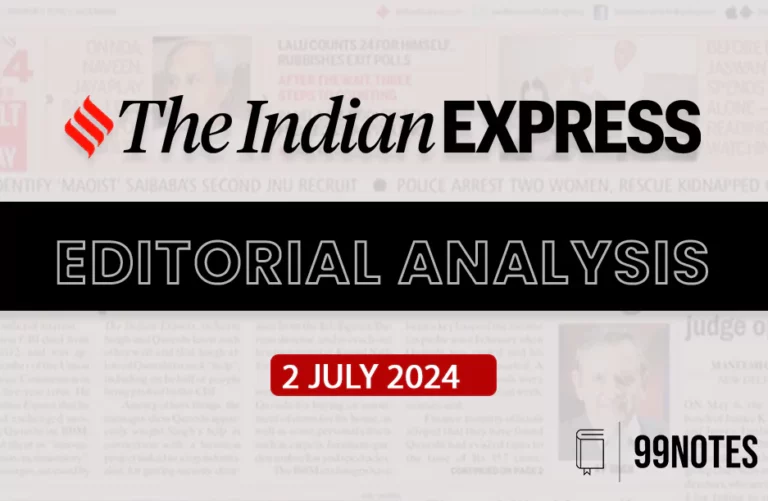12 July 2025: Indian Express Editorial Analysis
1. Mission Without A Mandate
(Source: Editorial Page, The Indian Express)
| Topic: GS Paper 2: Governance, Policy Interventions; GS Paper 3: Science & Technology – AI and Innovation Policy |
| Context |
|
India’s AI Push: Ambition Without Strategy
- India is aiming to be a global leader in AI, especially to represent the Global South in emerging technologies.
- The ₹10,000 crore India AI Mission, launched under the Ministry of Electronics & IT, is not backed by Cabinet endorsement, lacking clear authority, accountability, and strategic anchoring.
- The program is housed in a Section 8 company, functioning more like a bureaucratic entity than a national mission with bipartisan legitimacy.
Structural Challenges in India’s AI Ecosystem
- Weak Research Base: India’s R&D infrastructure is shallow, with limited global academic presence and few specialized PhDs.
- Venture Capital Trends: Most Indian VCs fund consumer-facing startups, not deep-tech innovation—which stunts the development of foundational AI capabilities.
- Disconnected Institutions: Coordination between industry, academia, and government is lacking, making it hard to drive scalable innovation in AI.
Why Parliamentary Oversight is Essential
- Unlike the U.S., China, or the EU, India lacks a national AI strategy endorsed by Parliament or backed by a clear legal framework.
- Parliamentary processes provide transparency, stability, and bipartisan consensus—essential for shaping a robust, long-term AI governance model.
- Without such oversight, India’s AI ecosystem remains fragmented and vulnerable to shifts in political will or administrative leadership.
Consequences of a Weak Governance Framework
- The absence of democratic anchoring weakens India’s credibility in global forums where AI ethics and regulation are being negotiated.
- India risks becoming just a consumer market rather than a deep-tech innovator, dependent on foreign models.
- Without alignment with parliamentary values, AI policy could undermine civil liberties, digital rights, and inclusive development goals.
Conclusion
- India stands at a pivotal juncture in the global race for AI leadership.
- However, its current approach—lacking a mandate from Parliament, a Cabinet-approved strategy, or institutional coordination—risks falling short of its transformative potential.
- To lead responsibly, India must embed its AI vision within a democratic framework that ensures accountability, innovation, and strategic depth.
Way Forward
- Cabinet-Endorsed AI Strategy: India must develop a National AI Strategy, tabled and debated in Parliament, with clear R&D, security, and innovation roadmaps.
- Institutional Coordination: Establish an empowered AI Governance Body involving academia, private sector, and civil society to ensure long-term coherence.
- Legislative Oversight: Create a Parliamentary Standing Committee on Emerging Technologies to periodically assess policy progress, address ethical concerns, and ensure inclusive digital growth.
- Public Trust Through Debate: Engage the public through transparent discussions on AI’s impact on jobs, privacy, and national security to build legitimacy.
| Practice Question: (GS-2 | 15 Marks | 250 Words)
Discuss the importance of a Parliamentary-backed national strategy for emerging technologies such as Artificial Intelligence in India. How can India align technological ambition with democratic accountability? |
Also Read: The Hindu Editorial Analysis- 12 July 2025
2. As America Slips
(Source: Editorial Page, The Indian Express)
| Topic: GS Paper 2: International Relations – India–USA Relations; GS Paper 3: Indian Economy – Global Economic Trends and Impact; GS Paper 1: Globalization and Its Effects |
| Context |
|
America’s Internal Contradictions and Strategic Shift
- The editorial compares America’s current condition to an autoimmune disease, wherein its institutions—education, immigration, industry—are attacking their own foundations.
- Policies driven by populist slogans like “Make America Great Again” have led to anti-immigration rhetoric, technological isolation, and policy irrationality, weakening long-term national strength.
- Declining university funding, talent rejection through immigration restrictions, and a backlash against science have worsened the situation.
Global Impacts of America’s Decline
- America’s universities, once a hub for global talent, are losing ground. Over 50 universities now face funding threats, and research funding is being diverted or politically questioned.
- This affects innovation, as institutions lose leadership in basic sciences, statistics, economics, and AI research.
- The editorial warns of a collapse in U.S. scientific authority, explaining the global pushback in AI, chip supply chains, and digital governance frameworks.
Opportunities for India Amid US Decline
India stands to benefit in three primary ways:
-
Attracting global talent and investment, especially in tech and manufacturing.
-
Reclaiming leadership in basic science and research, provided policies are reformed.
-
Becoming a preferred geopolitical and economic partner to nations pivoting away from the U.S.
Challenges India Must Overcome
- Despite the opening, India needs to address its own internal deficits in higher education, infrastructure, and policy coherence.
- Reform is necessary in areas such as university autonomy, ease of doing business, and skill development to be ready for global capital and innovation flows.
- To succeed where America falters, India must build credibility in rule of law, regulatory transparency, and institutional stability.
Conclusion
- America’s inward turn offers a short-term geopolitical and economic vacuum.
- While the decline of its traditional strengths like universities, scientific research, and liberal immigration pose global risks, it also opens doors for rising nations.
- India, with its demographic advantage, digital ecosystem, and policy reforms, has the potential to fill that gap.
Way Forward
- Boost Higher Education Reforms: Empower Indian universities with more autonomy, R&D funding, and international collaborations.
- Ease Immigration for Global Talent: Create policies to attract foreign researchers, PhDs, and entrepreneurs.
- Double Down on Core Industries: Focus on AI, chip manufacturing, energy innovation, and defense tech as India’s next-gen sectors.
- Stable Governance and Global Alliances: Reinforce India’s commitment to democratic values and multilateral frameworks to project itself as a trusted global partner.
- Incentivize Public–Private Collaboration: Leverage the vacuum created by American decline to foster new innovation partnerships.
|
Practice Question: (GS-2 | 10 Marks | 150 Words) |
Read more – 11 July 2025 : Indian Express Editorial Analysis





